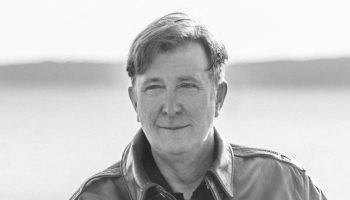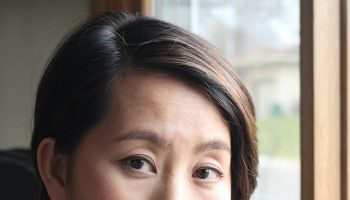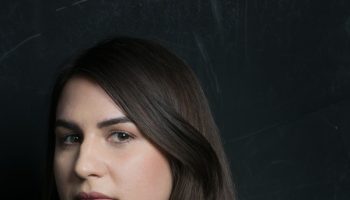Jessica Bruder wrote about the nation’s increasing amount of nomadic workers in “The End of Retirement” for Harper’s in 2014.
Six-thousand words later, she was still “full of questions.”
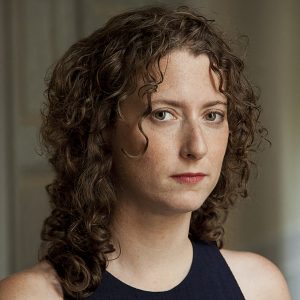
“I couldn’t help but wonder where they would go next,” Bruder said. “What would happen as they chased certain notions of freedom, formed itinerant communities and also faced the inevitable challenges?”
The storytelling — and curiosity — a magazine feature could not satisfy became her book Nomadland: Surviving America in the Twenty-First Century, a nonfiction account of the tens of thousands of Americans unable to afford retirement.
These “workampers,” as Bruder calls them, abandon their “stick-and-brick” homes for an migratory lifestyle, pursuing work from the Amazon CamperForce warehouse in Texas to the sugar beet fields of North Dakota. Their vans become their vehicle for security, their watering hole of community and their next great adventure.
Bruder will discuss her book in the Chautauqua Literary and Scientific Circle Roundtable at 3:30 p.m. Thursday, Aug. 2, in the Hall of Philosophy.
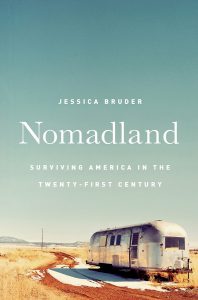 Nomadland illustrates the Week Six theme of “The Changing Nature of Work” in its “humanizing” of the lives and the struggles of workampers, according to Dave Griffith, vice president and Emily and Richard Smucker Chair for Education.
Nomadland illustrates the Week Six theme of “The Changing Nature of Work” in its “humanizing” of the lives and the struggles of workampers, according to Dave Griffith, vice president and Emily and Richard Smucker Chair for Education.
“This was a story that just wasn’t being told,” Griffith said.
Bruder’s reporting urges readers to “completely rethink” their idea of work, Griffith said, and how tangible the connection between work and identity is for many Americans.
“It’s a provocative book in that way because it gets you thinking about why work is meaningful to people,” he said. “She dramatizes for us the drive and the desire people have for meaningful work.”
Bruder’s book weaves together the stories of nomads like the setup of a joke — a cop, a minister, a college professor — who uprooted their lives to make ends meet after the 2008 recession left them underwater.
To gain the full picture of this inspired, undeterred subculture, Bruder traveled alongside these Americans, often accompanied by her “Van Halen,” a fitting name for the pun-loving group of workampers.
Griffith said Bruder’s immersive reporting makes this community come alive.
“You are traveling along with them,” he said. “She has an eye for the facts, eye for the details, but also has an ability as a storyteller to create these rich characters, which is not a skill that all journalists have.”
The book’s protagonist, Linda May, is a Renaissance woman. She has held jobs that run the gamut from insurance executive to cocktail waitress. A grandmother and independent spirit, she realized the solution to her lack of financial security lay in an RV.
“The biggest perspective shift, for me, came with documenting how radically Linda May and the other nomads reinvented their lives and routines, often in the face of great adversity,” Bruder said.
Getting the RV road-ready was an adventure in and of itself for May. As Bruder wrote, a temporary job “removing signage and repairing walls” for the Veterans Affairs hospital allowed May to save up to buy the “Squeeze Inn,” worth $17,000, for $4,000 plus an additional $1,200 for repairs.
Bruder enjoys narrative storytelling because “human experiences are so vibrant, so messy and irreducible.”
“(I’m) a hardcore proponent of empathy in an increasingly polarized world,” Bruder said. “Stories are essential to that empathy agenda. They defang so many nasty ‘isms’ — racism, classism, sexism, tribalism — by allowing us to imagine ourselves in the lives of others.”
Bruder said the response to May’s story and the other characters in Nomadland has been varied.
“Some are upset about America’s stratified economy and threadbare social safety net,” she said. “Some feel empowered by the resilience and creativity of the people I wrote about. Others just hanker for a road trip.”
One of the phenomenons Bruder details is the Rubber Tramp Rendezvous, an annual free convention near Quartzsite, Arizona, for nomads like May looking for socializing, classes, networking and an opportunity to reconnect with friends. Here, workampers may share stories of working conditions at the Amazon CamperForce or venues for affordable medication and eyeglass exams.
As Bruder writes, the Rubber Tramp Rendezvous provides relief and entertainment, food and song, a brief hiatus in a mobile life.
Bruder enjoys the different ways readers engage with her work and the aspects of Nomadland that resonate with people.
“I don’t want to tell people what they should think, but if I can convince them it’s worth spending some time immersed in experiences quite different from their own, that excites me,” she said.
The nomad lifestyle, and the search for senses of security and freedom, become inevitable and ceaseless for many of these Americans living paycheck to paycheck, finding sustenance from seasonal jobs on a state-by-state, week-by-week basis.
May too wrestles with this, as Bruder writes in her book. May’s dream — and solution — is to build an “Earthship,” a sustainable, permanent home made of upcycled materials. For May, Earthships promise stability and security, but they come with a high price tag: land, metals, geothermal heating and physical labor are just a few of the resources necessary.
But this dream, and the ability to live nomadically, does not come easy. Finding a place to freely park and rest a multifoot van is a struggle. As Nomadland details, workampers rely on friendly cops, inconspicuous paint colors or Walmart parking lots.
Even finding migrant work for gas money or assimilating to the van community may seem inaccessible for some Americans.
Becoming a nomad, as Bruder addresses in her work and book reviewers have pointed out, seems to be an option primarily for white Americans.
Since Bruder’s book has been published, she has noticed the “fault lines” her book exposes deepen.
“The push to criminalize the houseless seems to have intensified,” she said. “Cities have been cracking down on vehicle-dwellers in ways that are cruel and counterproductive.”
Traveling alongside May and witnessing workampers’ stories of resilience and ingenuity in the face of adversity has “expanded my sense of the possible,” Bruder said.
“It also made me feel increasingly impatient with how timidly our society confronts massive problems, from environmental devastation to staggering economic inequality,” she said. “We don’t think — or act — radically enough. We could dream much bigger.”


